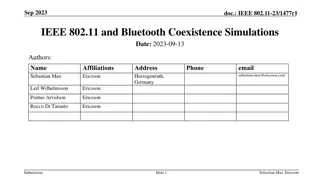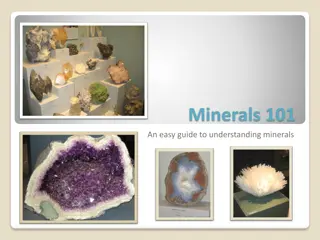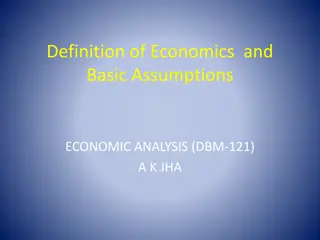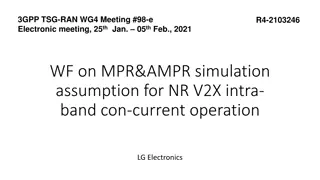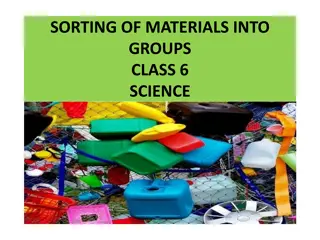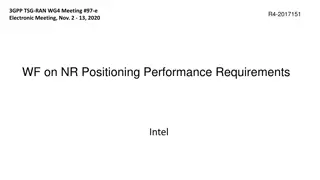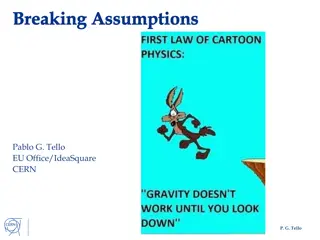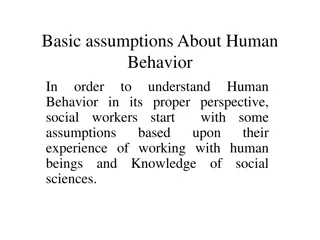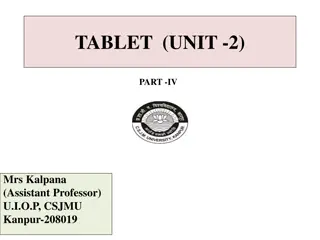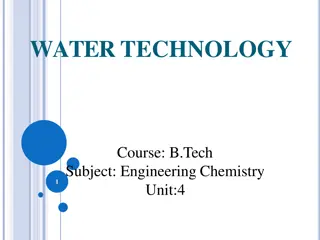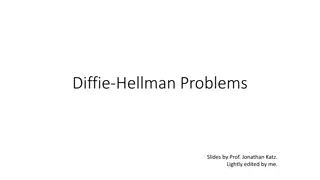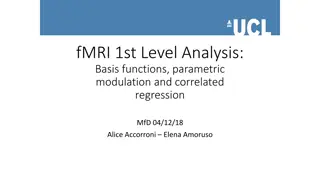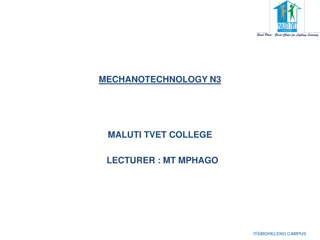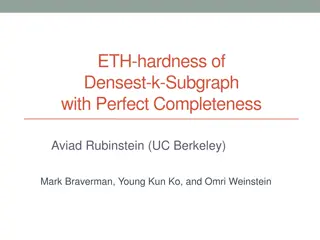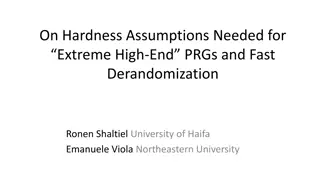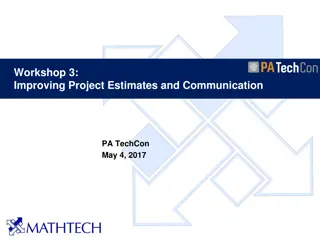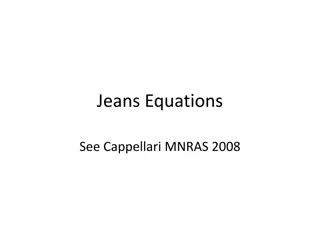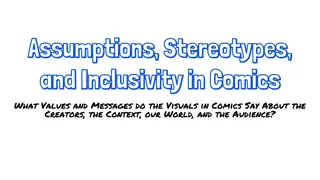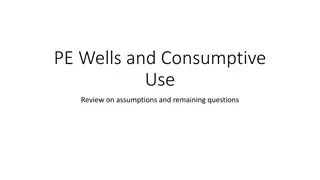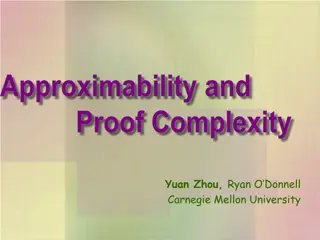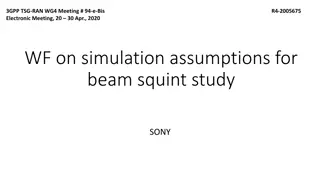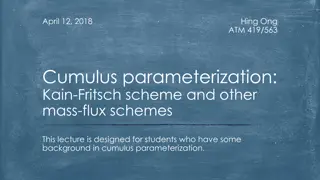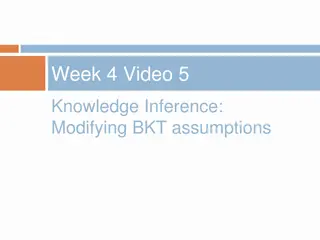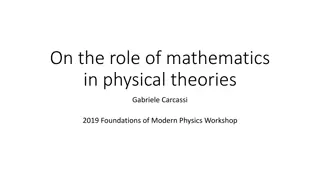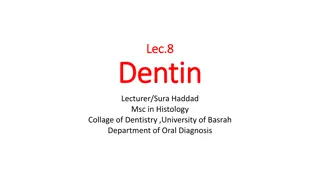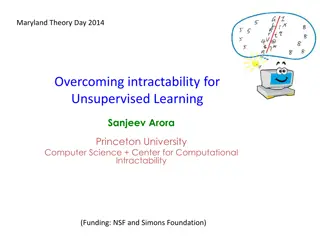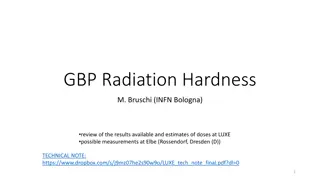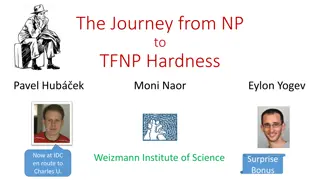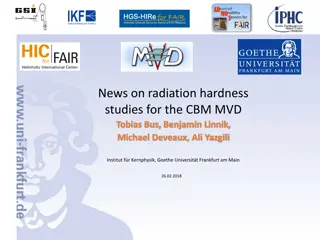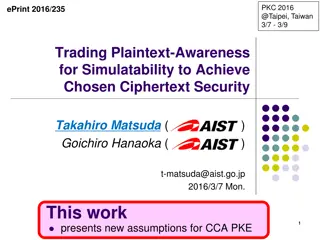IEEE 802.11 and Bluetooth Coexistence Simulations: Assumptions and Models
This document presents simulations on the coexistence of IEEE 802.11 (Wi-Fi) and Bluetooth technologies in the 5.945GHz to 6.425GHz spectrum. It explores various assumptions and models, including spectrum usage, channelization, scenario setups for Bluetooth and Wi-Fi links, and the capabilities of b
6 views • 54 slides
Analyzing Hydrologic Time-Series for Flood Frequency Analysis
This content delves into the methods and assumptions involved in studying hydrologic time-series data for flood frequency analysis. It covers topics such as different types of assumptions, including independence and persistence, and highlights how streamflow data can be analyzed to find annual maxim
7 views • 97 slides
Understanding Minerals: A Comprehensive Guide
Earth's crust is composed of rocks made up of different minerals, which are naturally occurring, inorganic solids with distinct atomic structures and chemical compositions. Minerals exhibit properties like solidity, natural occurrence, inorganic nature, fixed composition, and crystal form. Identifyi
1 views • 20 slides
Understanding Economics: Definitions and Basic Assumptions
Economics is a social science that examines how individuals, businesses, and governments allocate resources to satisfy unlimited wants in the face of scarcity. It involves decision-making processes and the study of human behavior in relation to the allocation of scarce resources. Basic assumptions l
0 views • 9 slides
Overview of RF Architecture and Waveform Assumptions for NR V2X Intra-Band Operation
In the electronic meeting of 3GPP TSG-RAN-WG4, discussions were held on the RF architecture and waveform assumptions for NR V2X intra-band operation in band n79. Various options and recommendations were presented regarding RF architecture, antenna architecture, and waveform definitions for efficient
1 views • 7 slides
Understanding Material Classification and Properties in Science
Explore the importance of grouping materials based on their properties, such as appearance, hardness, solubility, density, and transparency. Discover how materials are classified and grouped, benefitting us in organization, efficiency, and study. Learn about the significance of material characterist
0 views • 15 slides
3GPP TSG-RAN WG4 Meeting #97-e Summary
The 3GPP TSG-RAN WG4 Meeting #97-e held an electronic meeting to discuss NR positioning performance requirements. Agreements were made in the first round, with discussions ongoing in the second round. The work plan focuses on performance parts based on SA testing, with a detailed WP available in the
1 views • 11 slides
Unlocking Creativity and Innovation: Lateral Thinking vs Logical Thinking
Embrace the power of lateral thinking to challenge assumptions, generate new possibilities, and break free from traditional logic. Discover how logical thinking and lateral thinking differ in their approach to problem-solving, and learn how to leverage both methods to spur creativity and innovation.
1 views • 35 slides
Key Assumptions About Human Behavior for Social Workers
Human behavior is purposeful, meaningful, driven by conscious and unconscious motives, influenced by multiple factors, and shaped by early life experiences. Social workers rely on these assumptions to understand human behavior effectively.
0 views • 6 slides
Understanding Water Hardness and Treatment Methods
Water plays a crucial role in the food industry, particularly in the dairy sector. This article explores the types of water, focusing on hard and soft water, and discusses temporary and permanent hardness. It also delves into various treatments for water hardness, such as the cold lime method, base
1 views • 27 slides
Quality Control Tests for Tablet Production
Quality control tests play a crucial role in ensuring the safety and efficacy of tablet products. This article discusses various parameters like general appearance, size, shape, unique identification markings, organoleptic properties, hardness, friability, weight variation, and content uniformity th
1 views • 11 slides
Understanding Water Hardness and Impurities in Water Technology
Water technology in the field of Engineering Chemistry explores sources of water, major impurities, hardness of water, and distinctions between hard and soft water. The content delves into the impact of mineral concentrations on soap lathering, categorizes hardness into temporary and permanent forms
1 views • 72 slides
Understanding Diffie-Hellman Problems in Cryptography
Exploring Diffie-Hellman assumptions and problems including Computational Diffie-Hellman (CDH) and Decisional Diffie-Hellman (DDH). Discusses the difficulty of solving the DDH problem compared to CDH and discrete logarithm assumptions. Covers examples and implications of these cryptographic challeng
0 views • 6 slides
Understanding fMRI 1st Level Analysis: Basis Functions and GLM Assumptions
Explore the exciting world of fMRI 1st level analysis focusing on basis functions, parametric modulation, correlated regression, GLM assumptions, group analysis, and more. Dive into brain region differences in BOLD signals with various stimuli and learn about temporal basis functions in neuroimaging
0 views • 42 slides
Understanding Metals: Properties and Heat Treatment Processes
Metals can be categorized into ferrous and non-ferrous based on the presence of iron. Ferrous metals contain iron, while non-ferrous metals do not. Each type has distinct properties like toughness, tensile strength, elasticity, plasticity, ductility, malleability, and hardness. Heat treatment proces
0 views • 9 slides
Developing Strategic Thinking Skills through Comprehensive Analysis
Strategic thinking involves challenging assumptions, understanding the whole picture, and exploring new ideas. By shadowing to gather insights and understanding current workflows, barriers, and assumptions, one can develop a system view and experiment with innovative solutions to drive strategic obj
0 views • 5 slides
Alternative Depreciation Method for Modeling PPE Balance
In the context of modeling the balance of existed Property, Plant, and Equipment (PPE) for start-ups and fast-growing IT companies, the challenge lies in determining retirement rates with limited information. The approach involves making assumptions about starting retirement levels and growth rates,
4 views • 11 slides
Navigating Statistical Inference Challenges in Small Samples
In small samples, understanding the sampling distribution of estimators is crucial for valid inference, even when assumptions are violated. This involves careful consideration of normality assumptions, handling non-linear hypotheses, and computing standard errors for various statistics. As demonstra
0 views • 19 slides
Recent Applications of Quasi-Poly Time Hardness in Densest k-Subgraph
Recent applications of the Birthday Repetition technique have demonstrated the quasi-polynomial time hardness in various computational problems, including AM with k provers, Dense CSPs, Free games, and Nash equilibria. These applications also explore the potential implications in signaling theory an
0 views • 18 slides
Insights on Hardness Assumptions for Extreme PRGs
BPP=P requires certain complexity theoretical hardness assumptions. Recent advancements aim for extreme high-end PRGs based on stronger assumptions, presenting challenges in black-box proofing and loss factors. The cost of hybrid arguments for PRGs is analyzed, highlighting the need for qualitativel
2 views • 14 slides
Santa Monica College 2022-2023 Q1 Budget Update Presentation
This presentation outlines the budget update for Santa Monica College for the first quarter of 2022-2023. It covers major assumption changes, revenue assumptions, details of unrestricted and restricted general funds, including the Learning Aligned Employment Program and COVID-19 Recovery Block Grant
3 views • 15 slides
Effective Project Estimation and Communication Strategies
Learn about the importance of accurate project estimates, common estimation pitfalls, key components of estimates, documenting assumptions, typical assumptions to consider, and understanding the difference between effort and duration in project planning. Enhance your project management skills for be
0 views • 22 slides
Understanding High Net Worth Client Gift Planning and Philanthropy
Explore the role of trusted advisors in philanthropy, the disconnect between HNW clients and advisors, philanthropic motivations and assumptions, gift planning for the future, and how financial, social, and personal factors influence giving decisions. Gain insights into primary motivators such as do
1 views • 18 slides
Understanding Jeans Equations in Stellar Dynamics
The Jeans Equations and Collisionless Boltzmann Equation play a crucial role in describing the distribution of stars in a gravitational potential. By applying assumptions like axial symmetry and spherical symmetry, these equations provide insights into the behavior of large systems of stars. Despite
0 views • 7 slides
Understanding Assumptions, Stereotypes, and Character Depth in Comics
Assumptions and stereotypes play significant roles in comics, influencing how creators shape characters and convey messages. By examining round versus flat characters and the impact of stereotypes, we gain insights into the values and beliefs reflected in comic visuals and their implications for cre
0 views • 11 slides
Review on Wells and Consumptive Use Assumptions
This review focuses on projections and assumptions related to permit-exempt wells, growth rates, and baseline consumptive use in subbasins. Historical growth rates from 1999 to 2018 are analyzed to forecast future well connections. Growth allocation within subbasins is based on buildable lands analy
0 views • 13 slides
Approximability and Proof Complexity in Constraint Satisfaction Problems
Explore the realm of constraint satisfaction problems, from Max-Cut to Unique Games, delving into approximation algorithms and NP-hardness. Dive into open questions surrounding the Unique Games Conjecture, the hardness of Max-Cut approximations, and the quest to approximate the Balanced Separator pr
0 views • 25 slides
Simulation Assumptions and Performance Degradation Study on Beam Squint in 3GPP Meeting
Background on beam squint in conducted power of transmitted CCs causing radiative domain impairment and gain droop, with a problem statement on degradation of CC2 spherical coverage when CC1 and CC2 are separated by frequency. The study involves refined simulation assumptions to quantify radiative d
0 views • 7 slides
Understanding Cumulus Parameterization and Mass-Flux Schemes in Atmospheric Science
Explore the significance of mass-flux schemes in cumulus parameterization, their interaction with grid-scale microphysics, and the key elements and assumptions involved. Learn about the objectives, components, and limitations of classical cumulus schemes for atmospheric modeling. Gain insights into
0 views • 23 slides
Enhancing Bayesian Knowledge Tracing Through Modified Assumptions
Exploring the concept of modifying assumptions in Bayesian Knowledge Tracing (BKT) for more accurate modeling of learning. The lecture delves into how adjusting BKT assumptions can lead to improved insights into student performance and skill acquisition. Various models and methodologies, such as con
0 views • 51 slides
Understanding Economic Models: Assumptions, Deductive Reasoning, and Logical Fallacies
Economic models utilize deductive reasoning to simplify real-world economic relationships. Assumptions vs. implications are key components, where assumptions reflect reality or are simplifying. This process helps identify conditions for specific outcomes to occur and distinguishes between consequent
1 views • 17 slides
The Role of Mathematics in Physical Theories - Insights from Gabriele Carcassi's Work
Exploring the technical function of mathematics within physical theories, Gabriele Carcassi's research delves into developing a general mathematical theory of experimental science. This theory aims to derive the basic laws of physics from a handful of physical principles and assumptions, providing a
0 views • 50 slides
Understanding Dentin: Structure, Properties, and Functions
Dentin is a vital component of teeth, featuring various structural units such as dentinal tubules. This calcified tissue determines tooth shape, hardness, and radiolucency. It plays a significant role in supporting enamel, cementum, and pulp, with dentinal tubules housing odontoblast processes. Dent
0 views • 29 slides
Understanding Minerals: Properties and Identification
Minerals are naturally occurring solid inorganic substances with definite compositions and structures. They are classified based on physical and chemical properties. This content discusses the definition of minerals, the conditions that classify gold as a mineral, distinguishing mineral characterist
0 views • 29 slides
Unsupervised Learning Paradigms and Challenges in Theory
Explore the realm of unsupervised learning as discussed in the Maryland Theory Day 2014 event. Overcoming intractability for unsupervised learning, the distinction between supervised and unsupervised learning, main paradigms, NP-hardness obstacles, and examples like the inverse moment problem are co
0 views • 38 slides
Advancements in Sapphire Detectors for Radiation Hardness Testing and High-Energy Physics Experiments
Reviewing radiation hardness testing, dose estimates, and measurements at LUXE, this content delves into the use of sapphire detectors in high-energy physics experiments. Highlighting sapphire's material properties, such as high radiation resistance, low cost, and specific characteristics, the text
0 views • 13 slides
Insights into TFNP Hardness and Complexity from Various Perspectives
Delve into the realm of TFNP hardness and complexity through discussions on the journey from NP to TFNP, TFNP total function NP, barriers for proving TFNP hardness, Impagliazzo's Five Worlds, and more. Explore the nuances of NP, coNP, P, and NP completeness while pondering the weakest assumptions un
0 views • 36 slides
Welding Heat Flow and Cooling Rate Calculations
Understanding welding heat flow and cooling rate calculations is essential for determining the critical cooling rate in welding processes. Factors such as plate thickness, number of passes, and relative plate thickness play a crucial role in selecting the appropriate equations for calculating coolin
0 views • 10 slides
Monolithic Sensors for Radiation Hardness Studies in CBM MVD
High-tech advanced monolithic sensors are pivotal in conducting radiation hardness studies for the CBM MVD project. Leakage currents, radiation tolerance, and measurement techniques are explored, providing insights into current challenges and potential solutions in sensor technology development.
0 views • 8 slides
New Assumptions for Achieving Chosen Ciphertext Security in Cryptography
This research work focuses on presenting new assumptions for achieving chosen ciphertext security in public key encryption. The study aims to clarify the necessary and sufficient assumptions to realize general cryptographic primitives, particularly focusing on CCA secure PKE and KEM. The ultimate go
0 views • 27 slides
